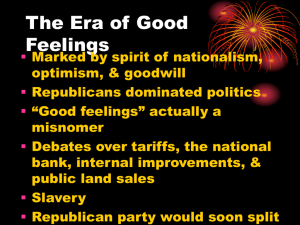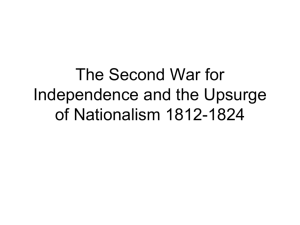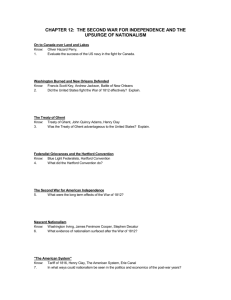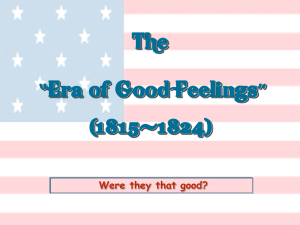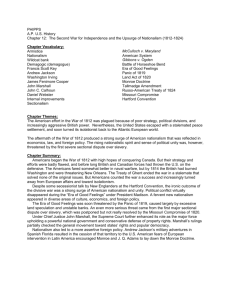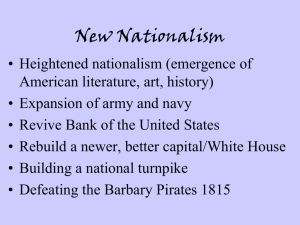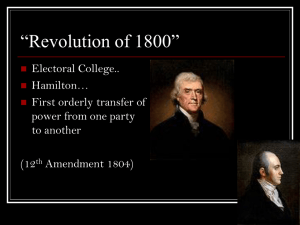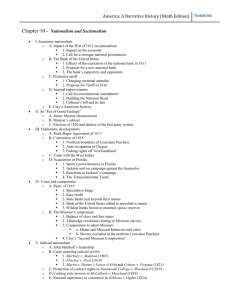Chapter 12 Slideshow
advertisement
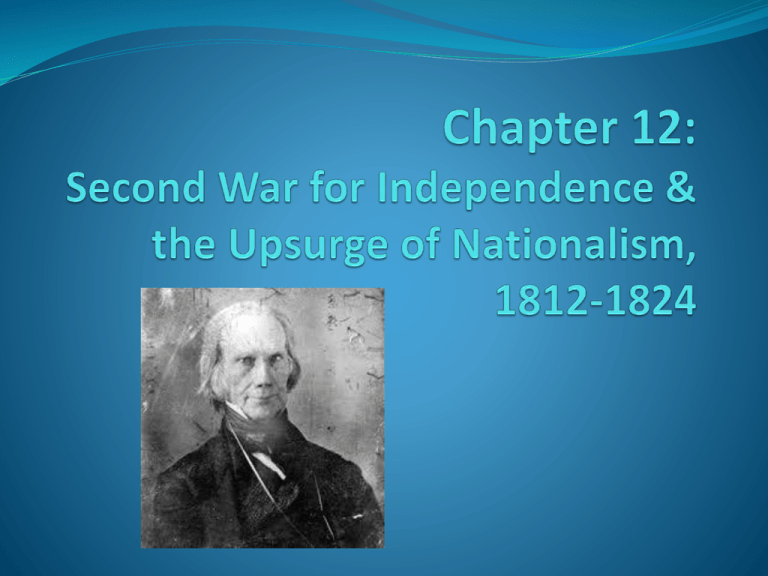
War of 1812 Military Highlights Ch. 11 Review - Battle of Tippecanoe: William Henry Harrison defeats Native Americans Battle of New Orleans: 2 weeks AFTER Treaty of Ghent, Andrew Jackson defeats British HUGE INCREASE IN NATIONALISM Francis Scott Key – “Star Spangled Banner” “Oh, say can you see…” Treaty of Ghent: (HENRY CLAY!!!!) Ended war: armistice, no gains or losses Hartford Convention Purpose: Discuss their complaints and seek compensation for losses during the war. Some delegates urged secession Proposed amendment to Constitution: 2/3 of Congress must agree for embargo, new states to be admitted, or war to be declared This was the deathblow for the Federalist Party Most of America experienced a sense of NATIONALLSIM!!! “The American System” Tariff of 1816: first tariff in American history instituted to protect nd) B ank ofnotUS industries, raise(2 revenue Henry Clay’s (Speaker of the House) American System I nternal Improvements (Know all 3 parts!!!) st TStrong arrifs (1816 – 1 Banking system (provide credit) Bank of the US Protective Tariff) 1. Protective tariff which would help industries Network of roads and canals, esp. in Ohio, valley that would help link the country together 2. 3. Democratic-Republicans felt it was unconstitutional. “Era of Good Feelings” James Monroe’s Presidency Coined by Boston newspaper, death of the Federalist party Some issues including; slavery, panic of 1819 Causes of Panic of 1819: Immediate cause: Overspeculation on frontier lands by banks (especially BUS) The Uneasy MO Compromise ME = Free, MO = Slave Balance between free and slave states at 12 36˚30’: everything above would prohibit slavery Most of US above that line Helps contribute to sectional differences MO Compromise lasted for 34 years MARSHALL COURT CASES 1.) Fletcher v. Peck (1810): • A Georgia legislature granted 35 million acres in the Yazoo River country (Mississippi) to private speculators. • The next legislature canceled the transaction. • The Supreme Court decreed that the legislative grant was a contract (even though fraudulently secured). • And that the Constitution forbid state law “impairing” contracts (Art. I. Sec. X, para. 1). • It further protected property rights against popular pressures. • Take-away: It asserted the right of the Supreme Court to invalidate state laws conflicting with the federal Constitution. 2.) McCulloch v. Maryland (1819) • The Supreme Court and judicial Nationalism (there are 3 cases that relate here). • Bolstered the power of the federal government at the expense of the states. • The suit involved an attempt by the State of Maryland to destroy a branch of the Bank of the United States by imposing a tax on its notes. • John Marshall declared the Bank of the United States constitutional by invoking the Hamiltonian doctrine of implied power. • He strengthened federal authority when he denied the right of Maryland to tax the bank – “the power to tax involves the power to destroy.” • Take-away: Gave the doctrine of loose construction its most famous formulation. 3.) Cohens v. Virginia (1821): judicial Nationalism (contd.) • Cohen brothers found guilty by the Virginia courts of illegally selling lottery tickets – against state law • They appealed to the highest tribunal. • State of Virginia won since the conviction was upheld. • Take-away: Virginia and all others states lose, since Marshall asserted the right of the Supreme Court to review all decisions of state courts in all questions involving powers of the federal government. 4.) Gibbons v. Ogden (1824) judicial Nationalism (cont.) • Grew out of an attempt by the State of New York to grant to a private company a monopoly of waterborne commerce between New York and New Jersey. • Marshall sternly reminded the state that the Constitution conferred on Congress alone the control of interstate commerce (see Art. I, Sec. VIII, Para. 3). • Take-away: He struck a blow at states’ rights while upholding the sovereign powers of the federal government. 5.) Dartmouth College v. Woodward (1819): • State of New Hampshire tried to turn Dartmouth College (private college) into a state institution. • Dartmouth appealed the case, employing Daniel Webster (‘01 alumnus). • Marshall ruled that the original charter must stand. • It was a contract—and the Constitution protected contracts against state encroachments. • Take-away: The Dartmouth decision safeguarded business enterprise from domination by the state governments. • It created a problem in the future because chartered corporations fell under state regulations. John Marshall’s Contributions • Marshall almost single-handedly shaped the Constitution along conservative (Federalist), centralizing lines that ran counter to the dominant spirit of the new country. • Through him the conservative Hamiltonians partly triumphed from the tomb. Sharing Oregon and Acquiring Florida Treaty of 1818: Set the northern limits of Louisiana purchase at 49th parallel Florida Purchase Treaty of 1819 Spanish ceded Florida, US gives up claims to TX Monroe and His Doctrine Monroe Doctrine (1823) US warns all of Europe to 1. 2. Not colonize Latin America Not intervene in Latin America In return, US would stay out of European affairs Reinforces nationalism Europe is angry, L.A. indifferent Doctrine has more of an impact in later years
